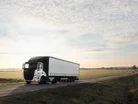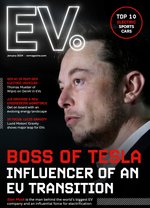Innovation and electrification of the road freight industry

It is no secret that the world of procurement and supply chain is resistant to change, though despite being notorious for its traditional ways, the function is breaking through its siloes with the help of innovative and dedicated leaders driving the adoption of modern practices.
One such way these leaders drive positive change is in the push for a more sustainable future with the adoption of EVs in logistics. A clean and effective solution that is capable of revolutionising the logistics industry, it is no wonder why the likes of DHL, FedEx and UPS are all embracing the solutions.
Versatile and suitable for road freight transportation
The road freight industry accounts for 7% of global CO2 emissions, consuming more than five million barrels of oil per year, leading organisations are making the switch to EV fleets to further their sustainability efforts while also cutting costs and maximising efficiency.
The benefits of EVs in logistic applications
While investing in change requires adaptations to processes, strategies and best practices, the benefits of EVs are clear:
- Increased stakeholder engagement: the focus on sustainable efforts only continue to rise among stakeholders, with investors particularly keen on those leveraging the latest innovations rto stay ahead of the curve.
- Reduced risk: with increased digitalisation, logistics can gain greater insight into their supply chain activities. Predictive analytics can help those in the industry foresee events on the road and improve vehicle maintenance. EVs can also improve driver safety. The introduction of autonomous vehicles and advanced driver assistance systems (ADAS) gives operators and drivers peace of mind that their machines are smarter and more capable of reacting to their environment.
- Reduced noise pollution: a social obligation to communities for businesses, noise pollution reduction has been a critical legislation in transport legislation. One particular benefit of EVs is the quiet nature of their motors.
- Flexibility and reliability: while the most well known application of EVs is on the road, they are not exclusive. Many organisations are using EVs throughout their supply chain, electrifying machines in construction, mining, warehousing, and ground support vehicles. With the addition of minimal moving parts, EVs are also more reliable with less time and money needing to be spent on repairs.
- Reduced emissions: crucial to corporate sustainability, EVs can help logistics to reduce not only Scope 1 emissions, but all emissions due to the lack of demand for fossil fuels combined with the minimal components to make them.
- Reduced costs: with the added benefit of digital management support, EVs can help logistics to operate in the most cost-effective way to charge their vehicles. Organisations can also work with charge point operators and installers to establish smart grids.
- Improved energy consumption and reduced dependence on fossil fuels: with the rise of digital technologies and their ability to manage the way energy is used and how much it costs, EVs can help organisations to improve their energy consumption. In addition, the rise in adoption of EVs will help organisations to remain successful in later years, future proofing logistics operations against the depleting resources of fossil fuels.
Despite the significant potential that EVs offer logistics, it is important to remember that “electrifying is good for business, but you need to be thoughtful,” says a UPS spokesperson.
Luke Wake, VP of Fleet Maintenance and Engineering at UPS explains: “We need the right vehicle to match the operational need first and foremost. Then we consider where it makes good business sense to grow and scale the electric fleet. That’s a recipe for adding EVs in the most beneficial way, positively impacting the environment and society.
“At UPS we are focused on continuing to test, validate, deploy and scale commercial electric vehicles throughout our global operations. We work alongside innovative companies to develop electric vehicle solutions that enhance our operations.”
Einride: Innovating in the EV road freight industry
One such company innovating in this space is Einride - a disruptive freight technology hyperscaler providing end-to-end solutions for electric and autonomous shipping.
Founded in 2016, Einride is driven by its manifesto to create a more desirable version of the future, one that aligns with human-centric values and the ecological necessities of the planet. Harnessing its Autonomous Electric Transport (AET) and an intelligent freight mobility platform, Einride is committed to changing road freight for good.
“Einride handles the complexity of electric and autonomous fleet operations so the shipper doesn’t need to. It points to this new era of shipping with a name that embraces unity and intuition,” says Robert Falck, CEO and Co-Founder of Einride.
Since its founding in 2016, Einride has raised over US$600mn in funding for its innovative solutions, accelerating the commercialisation of autonomous, electric transport systems. Its most recent funding round saw the company secure the largest asset-backed facility to date for heavy-duty electric vehicles (US$500mn).
“The time is now to act on not only developing but accelerating the implementation of technology that will create a cleaner, safer and more efficient way to move goods,” says Falck.
“We’ve created the Einride ecosystem to provide the most resilient and future-proof approach to electrifying freight today. With the support from our investors and shared belief in this mission, we’ll continue to drive disruptive change to global freight at scale.”
Einride: Working with global brands to create a cleaner, safer and more efficient way to move goods
Coca-Cola European Partners
Local to Sweden - HQ of Einride - Coca-Cola European Partners launched a commercial pilot in 2019 for the transportation of goods from its warehouse to food retailer Axfood harnessing Einride’s electric autonomous vehicles.
The partnership was formed to further the company’s focus on innovation and technology that is efficient and sustainable. The partnership also aligns with the DLF transport initiative to achieve 100% fossil free transportation domestically by 2025.
Falck commented on the partnership: “Road freight transport is responsible for around 7 % of global CO2-emissions and has only gone through incremental changes in the last decades. We are proud that a leading FMCG company like Coca-Cola European Partners has decided to join our intelligent movement. They show the industry, and society, that there is a better, more sustainable solution to transport goods, which is also safer and more efficient than the system we have today.”
Lidl
Partnering with Lidl in 2021, the long term partnership aims to electrify and automate deliveries from Lidl’s central warehouse to its stores, eliminating emissions and reducing costs compared to diesel trucks. The first major milestone for this partnership will be 2025, which will see a significant proportion of all deliveries taking place with electric vehicles. The hope is that a large proportion will also take place without a driver.
“This shows the industry that the transition to more sustainable and cost-effective shipping can easily begin today. The technology is here, and with Einride's mobility platform you secure the future of your deliveries with electric and autonomous transport. We are proud of our strategic partnership with Lidl, which drives innovation and builds a world-class logistics system,” says Jonas Hernlund, Chief Commercial Officer (CCO) of Einride.
A.P. Moller - Maersk
Partnering with A.P. Moller - Maersk in 2022, the partnership marked the largest electrification of heavy duty road freight and Einride’s first major expansion into the US. Delivering 3000 connected electric trucks between 2023 and 2025, A.P. Moller - Maersk will electrify its North American warehousing, distribution, and transportation business.
This partnership will provide A.P. Moller - Maersk with access to sustainable, cost-effective, transparent and high-performance electric transportation across all points of electromobility, with all trucks integrated using Einride’s data-driven operating system, Saga.
“This is one of the biggest deals ever made to make transportation sustainable, and it comes at a critical time,” says Falck.
“Not only is the road freight industry responsible for close to 8% of all global CO2 emissions – a number that will continue to grow if cost-effective change is not made today – but you also have a world that is more aware than ever before about the urgent need to shift to electric. I admire Maersk for its boldness in leading the way – for standing out in its commitments as a shipper to tangibly make the transition happen.”
Make sure you check out the latest edition of EV Magazine and also sign up to our global conference series - Sustainability LIVE 2024
**************
EV Magazine is a BizClik brand



